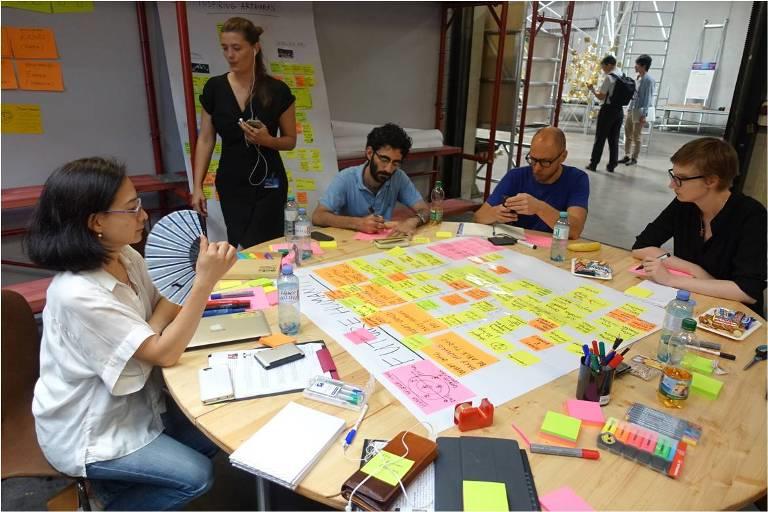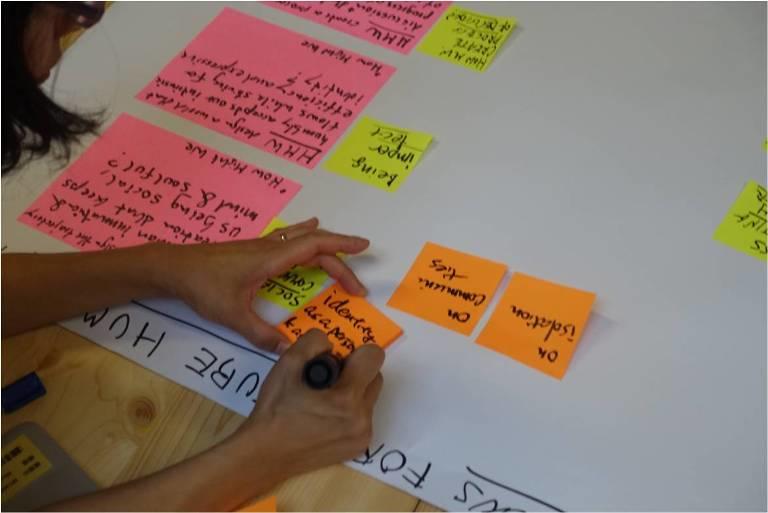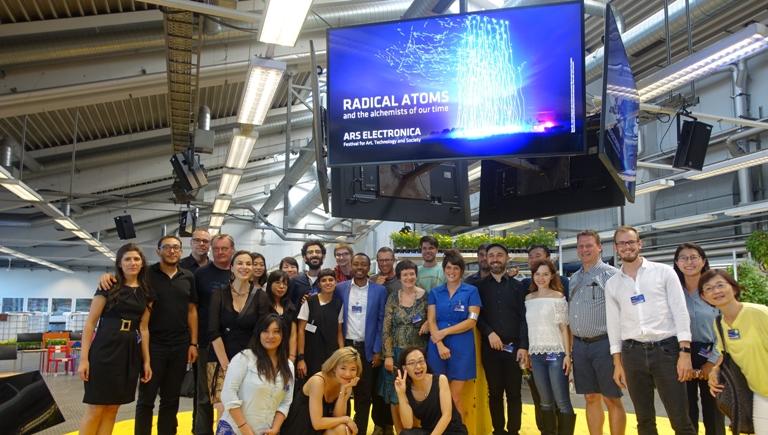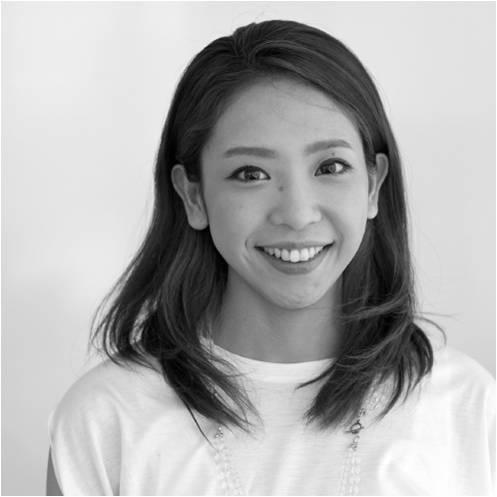- Viewpoints
- Events
The Ars Electronica Festival is a vast experience of media art held every September in Linz, Austria. Here is a report on the Future Innovators Summit, which Hakuhodo and Ars Electronica have cohosted for the past three years, by Kazuko Tanaka of Hakuhodo Group company VoiceVision, who facilitated at the Summit, and Rena Tanaka of Hakuhodo Creative Human Capital Planning & Management Division.
About the Future Innovators Summit
Ars Electronica, which explores the true means of science and technology for humankind, has in recent years made it its mission to generate “Agendas for Tomorrow” and organize a platform of diverse dialogues and connections for the purpose.
And that’s where Hakuhodo’s professionals come in with their fondness for people and gift of the gab.
The Future Innovators Summit (FIS), which Hakuhodo and Ars Electronica have organized together for the past three years, is where unexpected dialog occurs. Bringing together the finest young artists, scientists, entrepreneurs, and social activists from around the world, it consists of three days of sessions during which creative questions are asked, and are translated into fundamental agendas for the future for humankind. In development of a business requirement, concrete solutions are demanded for a specified challenge. Conventional solution thinking asks for new ideas, and it is still an essential procedure in daily projects, but these ideas lie within the arena of the challenge already spelled out. Why we need to keep talking about and thinking of the correct question is because true innovation lies beyond imaginable issues or our limited visions. Questions need to be creative enough to stretch our imagination and turnover our common sense, and it also needs to be deep enough to keep our discussions running in seek for tomorrow’s humanlife.
Let’s try formulating a hypothetical creative question on, for example, how information could be shared between neighbors. Say someone proposed that it would be more convenient if neighbors could share information more easily. That proposition, however, is rooted in the thirty or forty or fifty years of experience that that person has acquired over the course of their life and the values they have developed in the process. If two people from completely different cultural backgrounds were to discuss the issue, one might argue for closer communications in case an emergency should occur, while the other might go so far as to say, “I don’t care about the neighbors. I don’t even what to talk to them.” This is where you realize that, for instance, what people want to share with their neighbors is neither information nor confirmation of their wellbeing, but rather they are searching for the comfort zone of human warmth to barely remind each other of their existence. Which leads, perhaps, to the next question. “What defenses would allow you to have touch with human warmth of your neighbors only when you want to ?” The nub of the problem lies in the fact that not everyone necessarily thinks sharing information is desirable, yet people still need a community to belong to. In the original proposition convenience was the yardstick. But convenience isn’t everything, and what people expect of convenience differs from culture to culture. Thus creative questions are a way to shed preconceived notions and get at the essential core of what life will look like in the future.

At the Future Innovators Summit, held in the central area of the festival site. Innovators so intent in the discussions, they are oblivious of visitors passing through.

The Future Innovators Summit facilitation board, immediately covered with notes.
A Gathering of the World’s Innovators
Every participation at the FIS forces one to notice how susceptible to conventional thinking you are, however professionally acknowledged you may be in daily lives.
This year’s FIS brought together twenty-four innovators from across the globe, who were organized into five teams on the topics of future humanity, future education, and future commons. Each team, which represented the ultimate in diversity, was joined by a Hakuhodo facilitator, who played the role of listener and united the members into one.
Europeans, Arabs, Africans, Asians, and Americans; male, female, and transgendered; experts in biology, robotics, genetic engineering, urban design, and commons communities; music producers, educators, and speculative designers. The list is endless. It was a highly diverse medley of people, and getting them to come up with a single creative question based on shared apprehensions and hopes for humanity’s future proved quite an adventure. The joy of being a facilitator is succeeding in the daunting task of uniting these people into one, even while constantly worrying what tangent they’ll go off on next. That chaotic process is in fact a lot like talking to kids.
Imagine you were stripped of your business card and position, your company affiliation and social status. What would be left? FIS takes away nationality, race, and religion, not to mention prestige and past honors. That enables participants to frankly share their misgivings and hopes for the future, no holds barred, much as children who have yet to be labeled by society innocently ask “Why? Why?” In those circumstances the most essential requisite of a facilitator is the ability to listen.
I’m sometimes asked whether it’s even possible for a Japanese to facilitate a gathering of such colorful personalities from all over the world. I can confidently say that we non-native English speakers are well suited to the task. We listen all the more carefully because the proceedings are not in our native language, and the innovators for their part choose their words carefully so the facilitator understands. (And of course, most of the innovators themselves are non-English speakers.)
Ars Electronica arranges the summit and selects the individuals who take part. Hakuhodo serves as the engine that keeps the collider of people running for the three days. In combination the two form a well-balanced team.
The Five Creative Questions Formulated over the Three Days
The final Creative Question generated from this all too varied group of individuals could sometimes be rather vague. But in the process of getting to that conclusion you invariably gain insights that catch your breath. For reference’s sake, here are the Creative Questions (CQs) that were finally agreed on over the three days, aligned with a few sub-questions sought out along the way:
• Theme: Future Humanity
CQ: How to grow the empathy? – in a world of diversity and coexistence with the digital, what empathy do we need essentially to keep our human status?
CQ: How do we become more human? – Are we human today, even? What is it to be a human? What is it to be gradually human and non-human?
• Theme: Future Education
CQ: How can we re-map the order of knowing? – What is the true benefit of an education? Where will education take us? How do we follow the map of furture, with what knowledge and widom?
• Theme: Future Commons
CQ: What is sense of human being in the future? – When any and all information is available for to human and AIs equally, what will keep human community to humans?
CQ: What platform is required to define AI commons in the future? – If there is an ethical rule to human commons, who will define the rules of AI commons?
Where the Adventure with FIS Takes Us
The three-day summit explored how to come to terms with technology while reconsidering the relations with human society. Even the artists who participated admitted that they’d never discussed the essence of true humanity with anyone at such length. One artist bemoaned how thoroughly uncomfortable it felt to be cut loose from one’s professional and cultural background and thrown into a philosophical debate. But creating such an uncomfortable situation could perhaps lead to new discoveries that have as yet gone unnoticed.
Official website of the Ars Electronica Festival: http://www.aec.at/radicalatoms/en/fis/

Group photo of the participating innovators and facilitators taken after the presentation on the final day. The Future Innovators Summit seeks to bring together young people who will play a central role in art, technology, and society in the future. Participants are selected at the recommendation of Ars Electronica and Hakuhodo as well as from applicants from the general public.

Leader, Hakuhodo Working Moms’ Link

Hakuhodo Creative Human Capital Planning & Management Division.














